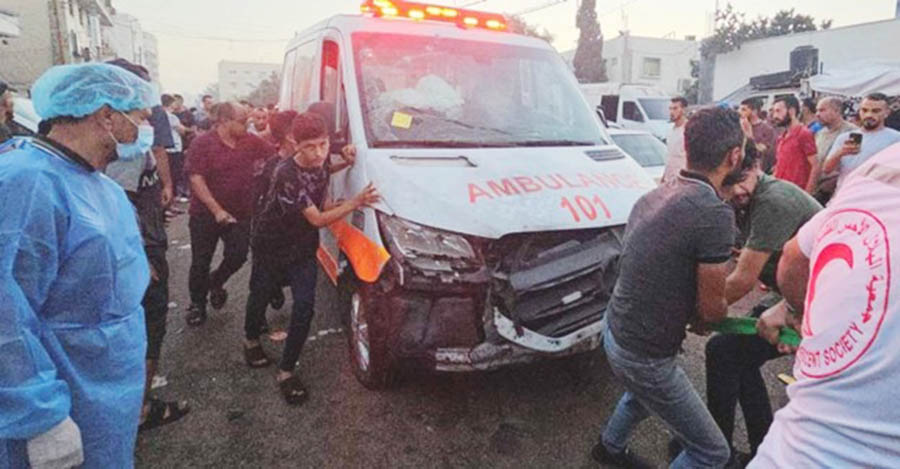GAZA/TEL AVIV/BEIRUT, (Reuters) – Israel struck an ambulance near a Gaza hospital yesterday in an attack the military said targeted militants, and Prime Minister Benjamin Netanyahu rejected calls by Washington’s top diplomat for a halt to fighting unless hostages held by Hamas are freed.
Warning Israel and the U.S. of a potential regional war, the leader of Lebanon’s Hezbollah said fighting on the Israel-Lebanon frontier could escalate further and hinted his Iran-backed group was ready to confront U.S. warships in the region.
Israel has vowed to wipe out Hamas, which rules the Palestinian Gaza Strip, after the militant group killed 1,400 people and took more than 240 others hostage in an Oct. 7 assault in southern Israel.
The Israeli military has struck Gaza from the air, imposed a siege and launched a ground assault, stirring global alarm at humanitarian conditions in the enclave. Food is scarce, medical services are collapsing and Gaza health officials say more than 9,250 Palestinians have been killed.
Ashraf al-Qidra, spokesperson for the health ministry in Gaza, said 15 people were killed and 60 wounded when Israel struck an ambulance that was part of a convoy at Gaza’s biggest hospital, al-Shifa.
Israel’s military said it had identified and hit an ambulance “being used by a Hamas terrorist cell” in the battle zone, and that a number of Hamas fighters were killed.
Hamas official Izzat El Reshiq said allegations its fighters were present were “baseless”. The military gave no evidence to support its assertion that the ambulance was linked to Hamas but said in a statement it intended to release additional information.
In a separate incident in Gaza City late on Friday, Gaza health officials said several Palestinians were killed and wounded in an Israeli strike on a school where hundreds of people were taking shelter.
Gaza health officials did not provide figures for the dead and injured. The Israeli military did not immediately provide comment on the incident.
In an evening briefing, Israeli military spokesperson Rear Admiral Daniel Hagari said that so far in the war Israel had killed 10 Hamas commanders responsible for planning the Oct. 7 attack.
“We killed and eliminated them and will continue to eliminate those who lead the combat against our troops, wherever they may be,” Hagari said.
Israel said 25 Israeli soldiers have been killed in fighting in Gaza since the military’s ground operation was expanded a week ago.
Aid agencies warn a humanitarian catastrophe is unfolding in the bloodiest episode in decades in the Israeli-Palestinian conflict.
Over half of Gaza’s 2.3 million population is now sheltering in U.N. Palestinian refugee agency facilities, with inadequate water and food, four U.N. agencies said in a joint statement.
On his second visit to the region since Oct. 7, U.S. Secretary of State Antony Blinken who met with Netanyahu in Tel Aviv, urged Israel to allow aid to enter Gaza and said Washington provided Israel advice on minimizing civilian deaths.
Speaking at a news conference, Blinken called for a humanitarian pause, saying it would allow for aid to enter Gaza, facilitate the work to secure the release of hostages while enabling Israel to achieve its goal of defeating Hamas.
“A number of legitimate questions were raised in our discussions today including how to use any period of pause to maximize the flow of humanitarian assistance, how to connect the pause to the release of hostages, how to ensure that Hamas doesn’t use these pauses or arrangements to its own advantage,” Blinken told reporters.
Speaking shortly after Blinken, Netanyahu in a televised statement rejected the idea.
“I made clear that we are continuing full force and that Israel refuses a temporary ceasefire which does not include the release of our hostages.”
Like Israel, the U.S. has dismissed growing international calls for a ceasefire but has sought to persuade Israel to accept localized pauses.
Jordan said on Friday the kingdom will host on Saturday a meeting between Blinken with his Saudi, Qatari, Emirati and Egyptian counterparts along with the participation of the Palestinians.
France plans to hold a humanitarian conference for Gaza’s civilians on Thursday, three diplomatic sources said.
Hezbollah leader Sayyed Hassan Nasrallah, in his first speech since Oct. 7, warned the U.S. that the conflict could widen if Israel did not stop its assault on Gaza.
A heavily armed ally of Gaza’s Hamas militants, Hezbollah has been engaging Israeli forces on the Lebanon-Israel border in the biggest flare-up since it fought a war with Israel in 2006.
“You, the Americans, can stop the aggression against Gaza because it is your aggression,” Nasrallah said.
“Whoever wants to prevent a regional war, and I am talking to the Americans, must quickly halt the aggression on Gaza.”
He added that Hezbollah, the spearhead of a Tehran-backed regional alliance hostile to Israel and the United States, did not fear the U.S. naval firepower Washington has assembled in the region since the crisis erupted.
Other Iran-aligned groups have entered the fray since Oct. 7, with Tehran-backed Shi’ite groups firing on U.S. forces in Iraq and Syria, and Yemen’s Houthis launching drones at Israel.
In Washington, a spokesperson for the White House National Security Council said it was aware of Nasrallah’s speech but would not engage in “a war of words”.
Hezbollah and other state and non-state actors should not try to take advantage of the conflict between Israel and Hamas, the spokesperson said.
More than 300 foreign passport holders and dependents entered Egypt from Gaza on Friday through the Rafah crossing, along with a small group of medical evacuees, according to Egyptian and Palestinian officials.
France said 34 of its nationals were among those who left. The White House said 100 U.S. citizens and family members left Gaza on Thursday and said another large group of Americans was expected to leave on Friday.






